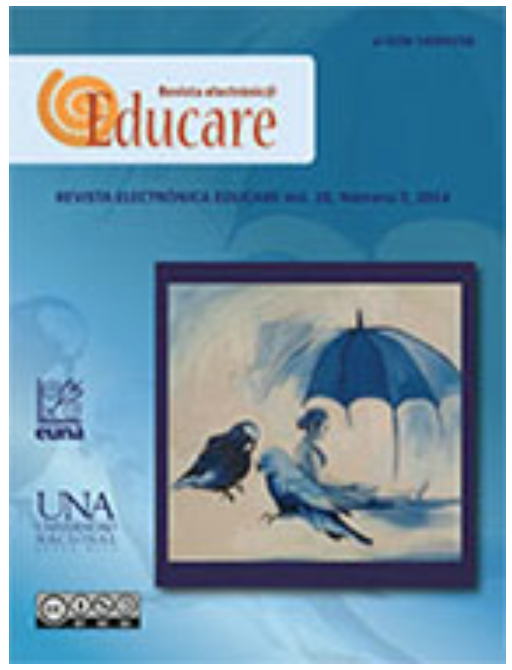Perceptions and Beliefs of Rural High School Coordinators in Costa Rica
DOI:
https://doi.org/10.15359/ree.18-2.2Keywords:
Ruralilty, pedagogical model, curriculum model.Abstract
Costa Rican rural settings include indigenous populations and groups in scattered areas that require considering issues such as language and culture, among others, to achieve an appropriate curriculum development. The National Institute of Statistics and Census (INEC) defines rurality based on the existence or lack of public services such as roads, communication, utilities, formation of the household, and participation in agricultural activities, among others. This research seeks to interpret the perceptions and beliefs of rural high school principals in Costa Rica, regarding technical and administrative conditions in compliance with the objectives for which the institutions were created. This is a longitudinal qualitative study, since data was taken from two workshops, one in 2010 with 49 rural high school coordinators and another one in 2012 with 205 participants including principals and teaching staff. Information was analyzed using an open-question questionnaire and a Venn diagram. Seventeen rural high schools were visited, and students, teachers, and parents from 45 rural high schools were interviewed during 2011 and 2012. It is concluded that there is still no real integration between the socio productive, personal and social areas with the academic area; therefore, teachers in the academic area should be trained in vocational aspects such as entrepreneurship, cooperativism, business management, as well as counsoling, physical education, arts, and music to trully meet the objectives for which rural high schools were created.
References
Aguilar, E. (2009). Un acercamiento pedagógico a las comunidades rurales. Encuentro asesores nacionales de la Dirección Curricular-MEP con docentes de la UNA. Heredia: CIDE, DER.
Aguilar, E., Carvajal, N., Cerdas, Y., Céspedes, E., Monge, M. E., Ovares, S., … Van Der Bijl, B. (2000). Educación rural, un acercamiento pedagógico. Heredia, Costa Rica: Litografía e Imprenta Segura Hermanos.
Brenes, C. (2010). Comunidades rurales: Criterios y herramientas para su diagnóstico. San José, Costa Rica: EUNED.
Consejo Superior de Educación. (2009). Modelo pedagógico de los liceos rurales. San José, Costa Rica: MEP.
Kozak, D. (2009). Las TIC y la formación docente. Recuperado de http://www.academia.edu/3822114/Las_TICs_en_la_formacion_docente
Mejía, N. (abril, 2008). La pedagogía para el desarrollo rural. Boletín Informativo extraordinario, División de Educación Rural. Centro de Docencia e Investigación, 2, 9-12. Recuperado http://www.cide-rural.una.ac.cr/index.php?option=com_joomdoc&task=cat_view&gid=39&Itemid=80
Ministerio de Educación Pública (2011). Diagnóstico en 14 liceos rurales indígenas. San José, Costa Rica: Instituto de Desarrollo Profesional.
Ministerio de Educación Pública (agosto, 2012a). Encuentro nacional de liceos rurales: “Fortaleciendo el área socio productiva en el marco pedagógico de los liceos rurales”. Escuela Juan XXIII. Cartago.
Ministerio de Educación Pública, Comisión reguladora de la oferta educativa. (2012b). Cambios de modalidades a las diferentes ofertas educativas. Sesión: 1, 2 y 3. San José, Costa Rica: Autor.
Ministerio de Educación Pública. Dirección de Planificación Institucional. Departamento de Análisis Estadístico. (2013a). Matrícula inicial en el sistema educativo según: Nivel y enseñanza. Dependencia: Pública, privada y subvencionada, periódo 2003-2013. Recuperado de http://www.mep.go.cr/indicadores_edu/cifras_1.1.html
Ministerio de Educación Pública. (2013b). Informe de labores 2012-2013. San José. Recuperado http://www.mep.go.cr/sites/default/files/informes/informe_2012_2013_vf.pdf
Miranda, G. (2011). Nueva ruralidad y educación en América Latina, retos para la formación docente. Revista Ciencias Sociales, 1-2(131-132), 89-113. Recuperado de http://revistas.ucr.ac.cr/index.php/sociales/article/view/3896/3767
Programa Estado de la Nación en Desarrollo Humano Sostenible. (2008). Estado de la Educación 2 (2ª ed.). San José, Costa Rica: CONARE.
Universidad de Costa Rica. Programa sociedad de la información y el conocimiento. (2011). Informe 2011. Hacia la Sociedad de la Información y el conocimiento en Costa Rica. San José, Costa Rica: PROSIC. Recuperado de http://www.prosic.ucr.ac.cr/sites/default/files/documentos/capitulo_1_0.pdf
Downloads
Published
How to Cite
Issue
Section
License
1. In case the submitted paper is accepted for publication, the author(s) FREELY, COSTLESS, EXCLUSIVELY AND FOR AN INDEFINITE TERM transfer copyrights and patrimonial rights to Universidad Nacional (UNA, Costa Rica). For more details check the Originality Statement and Copyright Transfer Agreement
2. REUTILIZATION RIGHTS: UNA authorizes authors to use, for any purpose (among them selfarchiving or autoarchiving) and to publish in the Internet in any electronic site, the paper´'s final version, both approved and published (post print), as long as it is done with a non commercial purpose, does not generate derivates without previous consentment and recognizes both publisher's name and authorship.
3. The submission and possible publication of the paper in the Educare Electronic Journal is ruled by the Journal’s editorial policies, the institutional rules of Universidad Nacional and the laws of the Republic of Costa Rica. Additionally, any possible difference of opinion or future dispute shall be settled in accordance with the mechanisms of Alternative Dispute Resolution and the Costa Rican Jurisdiction.
4. In all cases, it is understood that the opinions issued are those of the authors and do not necessarily reflect the position and opinion of Educare, CIDE or Universidad Nacional, Costa Rica. It is also understood that, in the exercise of academic freedom, the authors have carried out a rogorous scientific-academic process of research, reflection and argumentation thar lays within the thematic scope of interest of the Journal.
5. The papers published by Educare Electronic Journal use a Creative Commons License:














 The articles published by Educare Electronic Journal can be shared with a Creative Commons License:
The articles published by Educare Electronic Journal can be shared with a Creative Commons License: 



